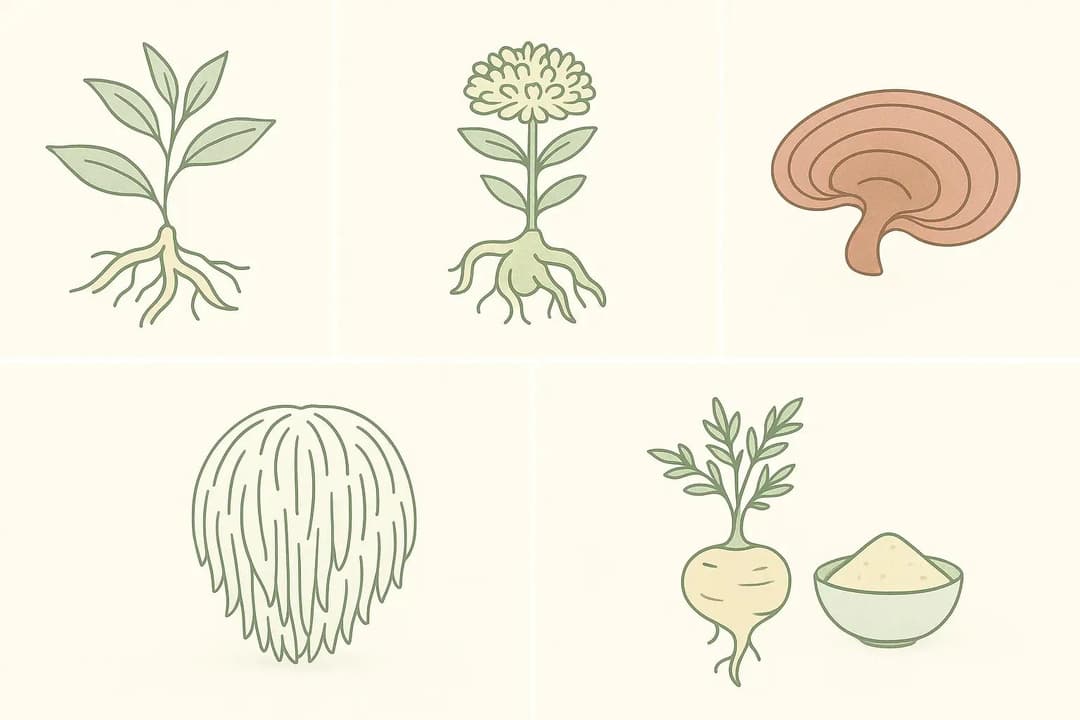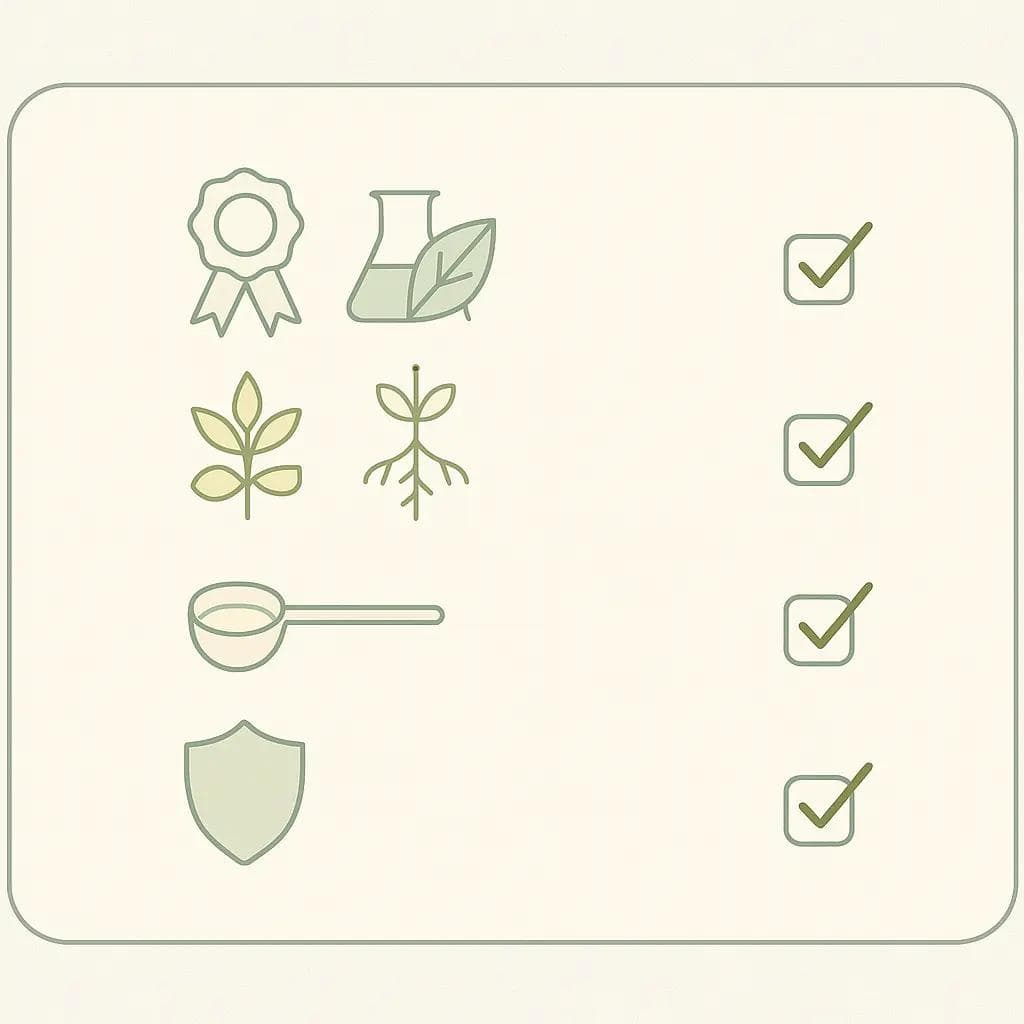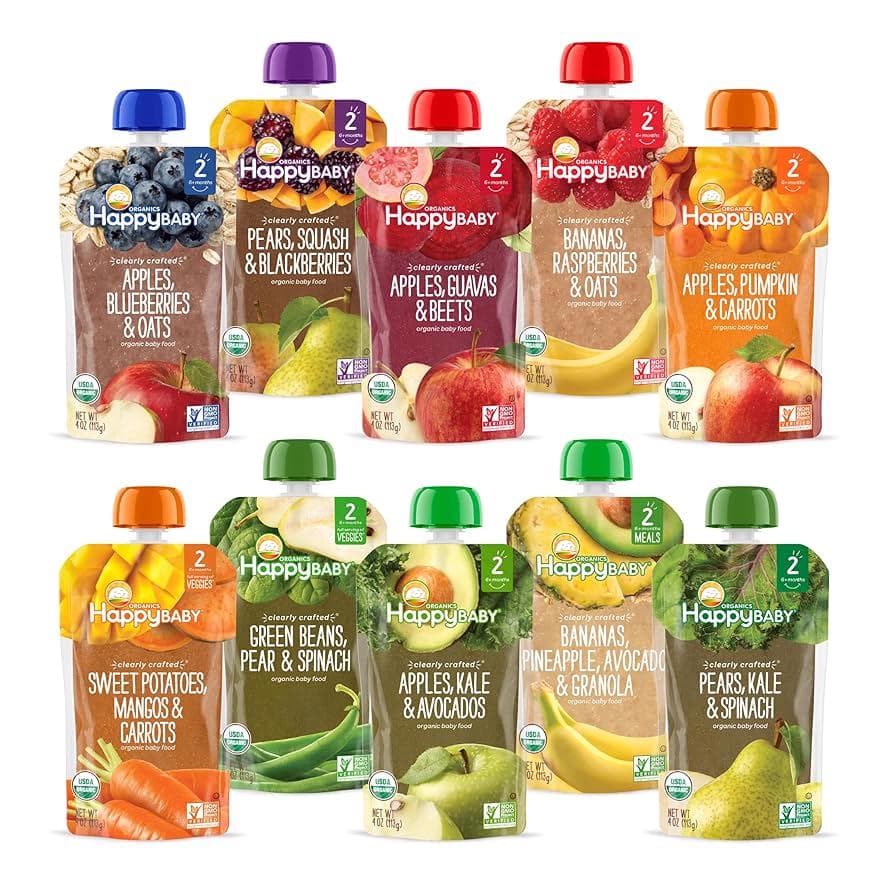

Adaptogens are herbs or mushrooms traditionally used to help the body manage stress. Modern research suggests some may modestly support mood, energy, or sleep—but results vary by extract, dose, and individual. Supplements aren’t FDA-approved to treat disease, so quality matters and expectations should stay realistic.
How to use this guide: For each adaptogen, you’ll see a Quick Take, What the science says, How to try, and Watch-outs so you can choose wisely.

Quick Take: The most studied adaptogen for stress. Several randomized trials and reviews report reduced perceived stress, anxiety, and cortisol, with small–moderate effects.
What the science says: An NIH review notes that many clinical trials (typically 6–12 weeks) found ashwagandha extracts lowered stress and improved sleep; benefits were often stronger around 300–600 mg/day. Meta-analyses published since 2021 generally agree but still call for longer, higher-quality studies.
How to try: Look for standardized root extracts from reputable brands. Common study ranges are 300–600 mg/day, but products differ—follow the label and speak with your clinician if you’re on medication, pregnant, nursing, or buying for a teen.
Watch-outs: Usually well tolerated short-term, but case reports link it—rarely—to liver injury and thyroid effects. Some experts advise avoiding during pregnancy.
Quick Take: Traditionally used for fatigue and resilience. Emerging human research suggests small improvements in mental fatigue and exercise performance, though findings are mixed.
What the science says: Reviews of clinical studies report benefits for perceived stress and fatigue; a 2025 meta-analysis found small ergogenic effects in some endurance outcomes, while other trials show trivial effects on cognition—so set expectations accordingly.
How to try: Many studies use standardized extracts (e.g., SHR-5) at 200–400 mg/day, often taken in the morning or early afternoon. Start low, go slow.
Watch-outs: Possible interactions (notably with some blood-pressure medicines like losartan), insomnia in some users, and limited safety data in pregnancy/breastfeeding. Talk with your clinician if you use prescription meds.
Quick Take: A classic “tonic” mushroom with a long history in East Asia. Early human research suggests variable effects on fatigue and sleep depending on the extract used; more robust trials are needed.
What the science says: Systematic and narrative reviews describe anti-fatigue and sleep findings that differ widelyacross formulas; authoritative cancer resources note no proven cancer-outcome benefit in humans to date.
How to try: Choose third-party-tested products (to confirm species, dose, and purity). Use as part of a broader sleep routine (light exposure, consistent bedtime).
Watch-outs: Reishi may increase bleeding risk with anticoagulants/antiplatelets and can interact with some therapies; avoid around surgery and discuss with your care team if you take blood thinners or immune-active drugs.
Quick Take: A culinary mushroom with nootropic buzz. Small human trials suggest tentative improvements in cognitive speed and perceived stress; evidence is early and mixed.
What the science says: A 2023 randomized trial in healthy adults found small gains in performance speed and lower subjective stress; a 2025 acute-effects study adds preliminary support but calls for larger, longer trials.
How to try: Favor fruiting-body extracts from brands that disclose standardization and testing. Because doses vary widely, follow the label and evaluate changes over 2–4 weeks.
Watch-outs: Generally well tolerated; occasional GI upset or skin rash reported. Use caution with blood thinners or diabetes meds; ask your clinician first.
Quick Take: A Peruvian root used for stamina and sexual health. Human studies point to modest improvements in sexual function and well-being in select groups; evidence for mood/energy is emerging.
What the science says: Systematic reviews and RCTs have reported benefits for sexual desire or function in men and postmenopausal women, with small–moderate effects and short durations. Data for general energy or mood are limited and heterogeneous.
How to try: Often used as a powder or capsule. Common study intakes range 1.5–3.5 g/day for 6–12 weeks, but follow your product label and assess tolerance.
Watch-outs: Long-term data are limited; if you have hormone-sensitive conditions, are pregnant, or use prescription meds, consult your clinician.

Herbs and mushrooms can interact with medications and aren’t risk-free.
If you like adaptogen drinks or powders, use Olive to scan for cleaner products—fewer additives, smart sweeteners, and transparent labeling—so your routine stays safe, simple, and effective. And remember: adaptogens work best alongside basics like whole-food meals, sleep, and stress-care.
Ashwagandha (efficacy & safety)
Rhodiola (efficacy & safety)
Reishi (interactions & safety)
Lion’s Mane (human trials)
Maca (human data & reviews)
This article is for education only and isn’t medical advice.
Instant Barcode Scane
Allergen Detection
Clear Ingredient Insights
Get Personalized Suggestions

Discover everything you need to know about Happy Baby Pouches: A Parent's Guide to ensuring safe and nutritious choices amidst heavy metals concerns.
Sep 25, 2025
Is sesame oil a seed oil? Yes — but not all seed oils are harmful. Learn why sesame oil is different from the “Hateful Eight” and discover the best sesame oil substitutes like oliv...
Sep 25, 2025Always.
We never monetize through brand deals, affiliate links, or ads — so you can trust our recommendations are always aligned with our users.
Effortless food scanning
Peace of mind for parents
Healthy product recommendations